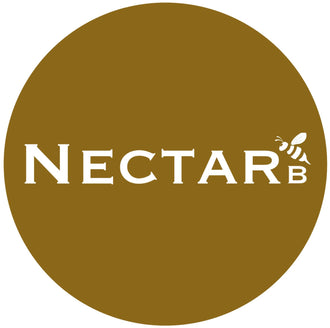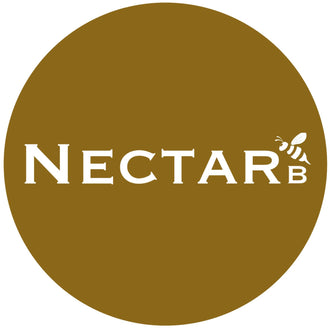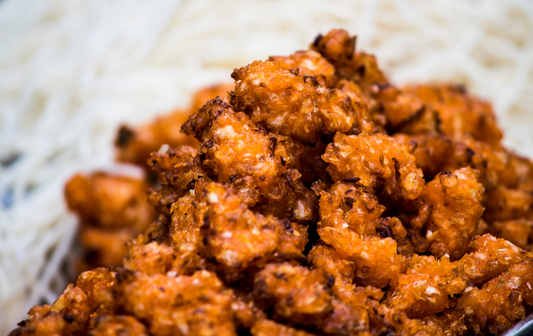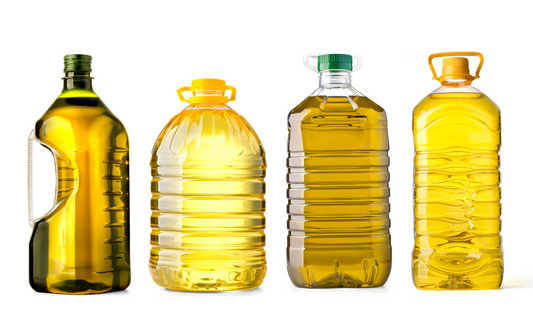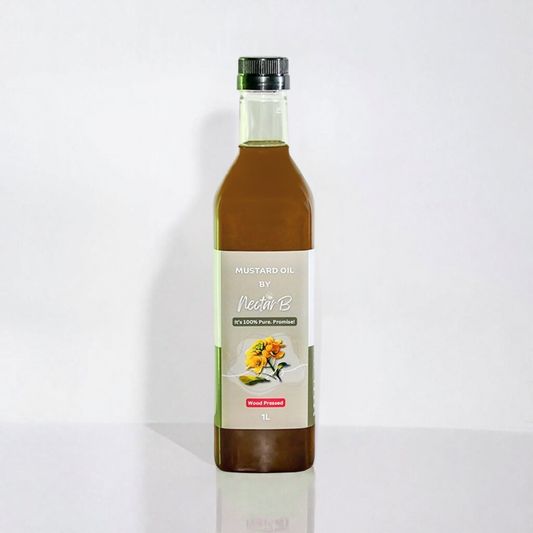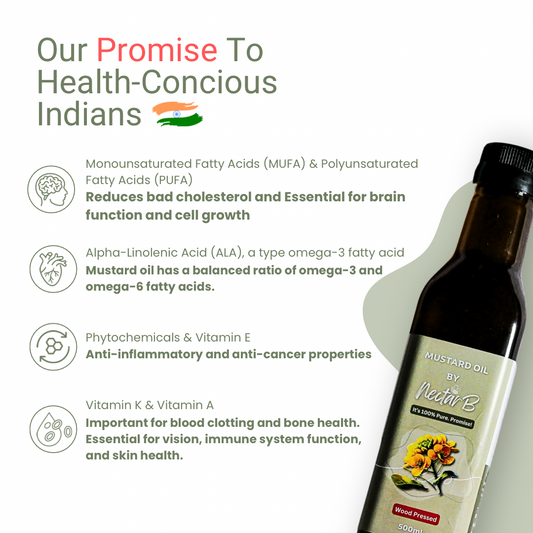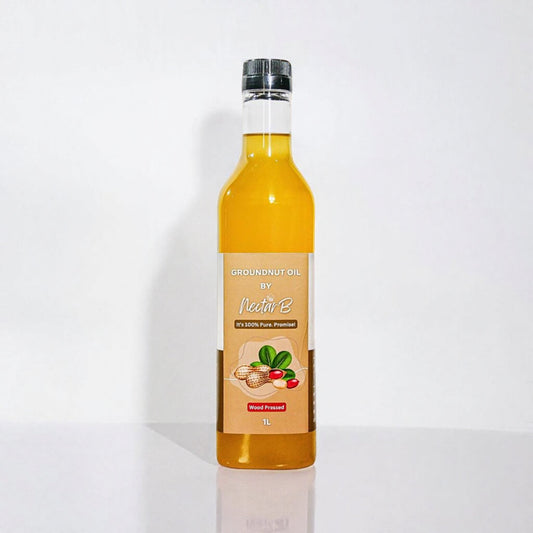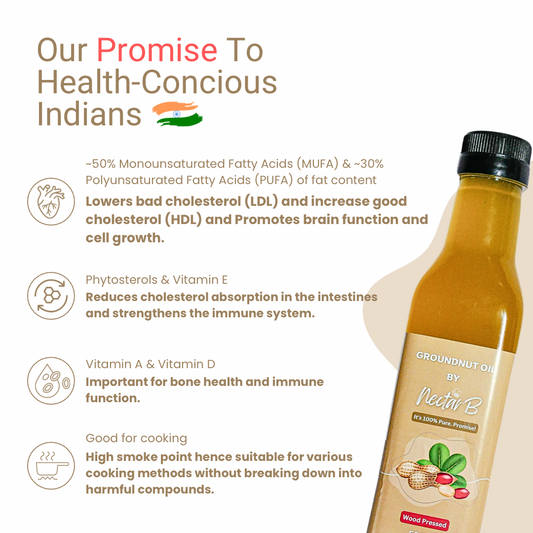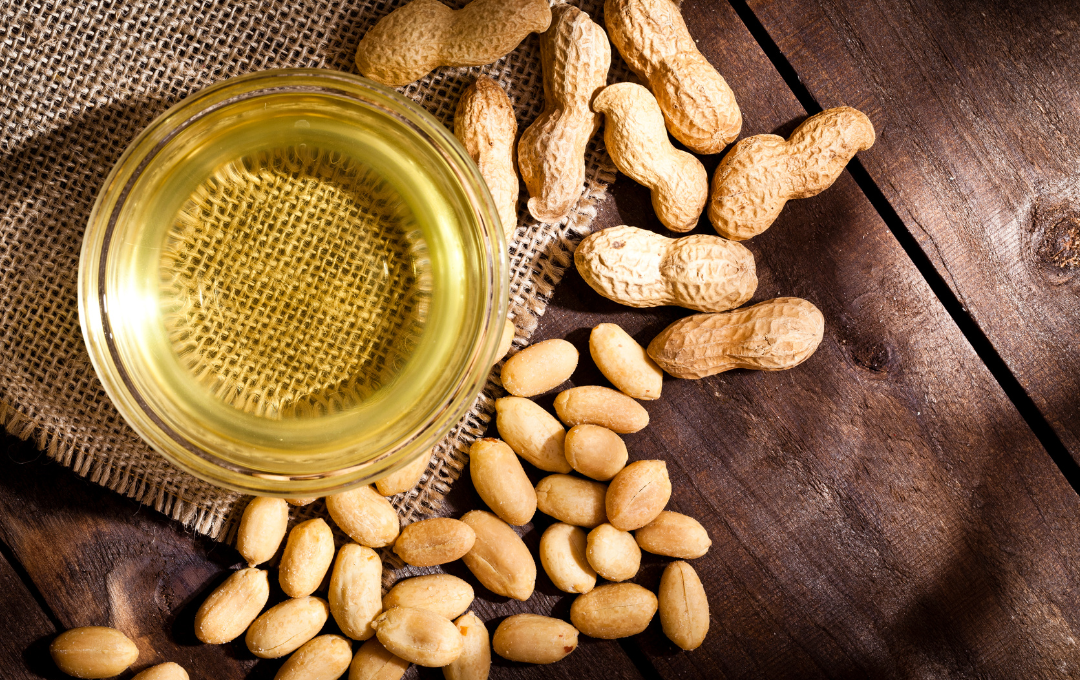
Why You Should Incorporate Peanut Oil into Your Diet: Benefits for Indians
Introduction to Peanut Oil
What is Peanut Oil?
Peanut oil, often referred to as groundnut oil, is derived from the seeds of the peanut plant. It’s a popular cooking oil known for its nutty flavor and high smoking point, making it ideal for frying and sautéing. Peanut oil is available in refined, unrefined, roasted, and cold-pressed varieties.
History and Origin
Peanut oil has a rich history, with its usage dating back to ancient Peru and indigenous cultures in South America. It later spread to Africa and Europe before making its way to Asia. It has been a staple in Indian cooking for centuries, particularly in southern and western states.
Nutrient Composition
Peanut oil, especially when wood-pressed, retains a rich nutritional composition due to the traditional extraction method that preserves its natural properties. Here is the typical nutritional composition of wood-pressed peanut oil:
- Monounsaturated Fats: Peanut oil is high in monounsaturated fats, which are beneficial for heart health. These fats can help lower bad cholesterol levels and reduce the risk of heart disease.
- Polyunsaturated Fats: It also contains polyunsaturated fats, including omega-6 fatty acids, which are essential for brain function and cell growth.
- Vitamin E: Wood-pressed peanut oil is a good source of vitamin E, a powerful antioxidant that protects cells from damage and supports immune function.
- Phytosterols: These compounds help reduce cholesterol absorption in the digestive system, contributing to lower cholesterol levels.
- Calories: Like all oils, peanut oil is calorie-dense, with about 120 calories per tablespoon, primarily from fat.
- Saturated Fats: While lower in saturated fats compared to other oils, it still contains a small amount, which should be consumed in moderation.
- No Trans Fats: Wood-pressed peanut oil does not contain harmful trans fats, which are associated with an increased risk of heart disease.
Properties of Groundnut Oil
Peanut oil, especially when wood-pressed, has distinct properties that make it a popular choice for cooking and other uses. Here are some key properties of wood-pressed peanut oil:
- Rich Flavor and Aroma: Wood-pressed peanut oil retains its natural, nutty flavor and aroma, enhancing the taste of dishes without overpowering other ingredients.
- High Smoke Point: Peanut oil has a high smoke point, typically around 450°F (232°C). This makes it ideal for high-heat cooking methods such as frying and sautéing, as it does not break down or produce harmful compounds at these temperatures.
- Stable Shelf Life: The oil is relatively stable and has a good shelf life when stored properly. The absence of heat and chemicals during the wood-pressing process helps preserve its natural antioxidants, which contribute to its stability.
- Nutrient Retention: The wood-pressed method ensures that peanut oil retains essential nutrients, including vitamins (like vitamin E) and healthy fats, which can be lost in refined oils.
- Light Texture: Peanut oil has a light texture and is less greasy compared to some other oils, making it suitable for a variety of culinary applications, from dressings to deep-frying.
- Health Benefits: Due to its high content of monounsaturated and polyunsaturated fats, wood-pressed peanut oil supports heart health by helping to reduce bad cholesterol levels. It also contains antioxidants that protect cells from oxidative damage.
- No Chemical Residues: The traditional wood-pressing method avoids the use of chemicals and high heat, resulting in a purer oil that is free from harmful residues and additives often found in refined oils.
- Versatility: Wood-pressed peanut oil is versatile and can be used in various cooking methods, including baking, roasting, and stir-frying. It is also commonly used in Asian cuisine due to its distinct flavor.
Health Benefits of Peanut Oil
Heart Health
Peanut oil is known for its heart-healthy benefits. Rich in monounsaturated and polyunsaturated fats, it helps lower bad cholesterol levels while maintaining good cholesterol levels. This can reduce the risk of heart diseases and improve overall cardiovascular health.
Skin and Hair Benefits
Peanut oil is not only beneficial for cooking but also for skin and hair care. It contains vitamin E, which moisturizes and revitalizes the skin while promoting hair growth and maintaining scalp health. The oil’s antioxidant properties help fight free radicals that cause aging.
Antioxidant Properties
Rich in antioxidants like resveratrol and vitamin E, peanut oil can combat oxidative stress and reduce inflammation. This helps protect the body against chronic diseases, including cancer and arthritis. Regular consumption can boost your immune system as well.
Rich in Vitamins and Minerals
Peanut oil is a good source of essential vitamins and minerals, including vitamin E, magnesium, and zinc. These nutrients support various body functions, from DNA repair and cell growth to immune function and wound healing.
Peanut Oil and Indian Cuisine
Traditional Indian Dishes with Peanut Oil
Peanut oil is a staple in many traditional Indian dishes, especially in states like Gujarat and Maharashtra. It is used for making sweets like ladoos, savory snacks, and dishes like dhokla and pakoras. Its neutral flavor enhances the authentic taste of these recipes.
Cooking Techniques
The high smoke point of peanut oil makes it perfect for deep-frying, sautéing, and stir-frying. It is commonly used in Indian cuisine for tempering spices, which involves heating oil and adding spices to release their flavors and aromas.
Balancing Flavors
Peanut oil's mild flavor helps balance the robust and spicy flavors characteristic of Indian cuisine. It doesn't overpower the dish, allowing the natural tastes of spices and other ingredients to shine through.
Popular Regions in India Using Peanut Oil
Peanut oil is prominently used in southern and western regions of India. States like Tamil Nadu, Karnataka, Andhra Pradesh, and Gujarat incorporate peanut oil extensively in everyday cooking and traditional festive recipes.
Comparing Peanut Oil with Other Cooking Oils
Nutritional Comparison
Compared to other cooking oils like palm oil and sunflower oil, peanut oil has a more balanced fatty acid profile. Its higher concentration of monounsaturated fats and lower levels of saturated fats make it a healthier alternative.
Smoking Points
Peanut oil has a high smoke point of about 450°F (232°C), making it suitable for high-heat cooking methods. This property makes it superior to oils with lower smoke points like olive oil, which can degrade and lose nutrients at high temperatures.
Flavor Profiles
While peanut oil has a neutral to slightly nutty flavor, other oils like olive oil have distinct, strong flavors that can influence the taste of dishes. This makes peanut oil more versatile and a preferred choice for various culinary applications.
Peanut Oil for Weight Management
Managing Calories
Peanut oil can be incorporated into a balanced diet to help manage calorie intake. While it is calorie-dense, using it in moderate amounts can provide essential nutrients without excessive calories, aiding in weight management.
Healthy Fats and Satiety
The healthy fats in peanut oil promote satiety, meaning they help you feel full longer. This can prevent overeating and support weight loss or maintenance efforts by controlling hunger pangs.
Metabolism Boost
The presence of healthy fats and vitamins in peanut oil can assist in boosting metabolism. A faster metabolism helps burn more calories at rest, contributing to effective weight management and overall health.
Is Peanut Oil an Allergen?
Yes, peanut oil can be an allergen for individuals with peanut allergies. However, highly refined peanut oil might not cause allergic reactions as the refining process removes the proteins that trigger allergies. It's essential to consult a healthcare provider for personalized advice.
Safety and Allergy Considerations
Identifying Allergies
It's crucial to identify if you have a peanut allergy before incorporating peanut oil into your diet. Symptoms can range from mild skin reactions to severe anaphylaxis, requiring medical attention. Always perform an allergy test if unsure.
Safe Consumption Tips
If you do not have a peanut allergy, consuming peanut oil in moderation is generally safe. It's advisable to check labels for potential cross-contamination and opt for high-quality, cold-pressed versions of peanut oil for maximum health benefits.
Handling Cross-Contamination
To avoid cross-contamination, store peanut oil separately from other allergy-prone foods. Ensure that utensils and cooking surfaces are thoroughly cleaned to prevent accidental exposure, especially if preparing food for someone with a peanut allergy.
Buying and Storing Peanut Oil
Best Brands and Types
Several reputable brands offer high-quality peanut oil, including cold-pressed and expeller-pressed varieties. Brands like Borges, 24 Mantra Organic, and Fortune are popular choices available in the Indian market.
Storage Tips to Maintain Freshness
Store peanut oil in a cool, dark place to maintain its freshness and prevent it from going rancid. It's ideal to use a glass or stainless steel container with a tight lid. Refrigerating peanut oil can extend its shelf life, especially during hot weather.
Shelf Life
Peanut oil generally has a shelf life of 12 to 18 months when stored properly. Always check the expiration date on the packaging and discard any oil that has developed a rancid smell or off-flavor to ensure food safety.
Environmental Impact of Peanut Oil Production
Sustainable Farming Practices
Sustainable farming practices in peanut cultivation can minimize environmental impact. Crop rotation, minimal pesticide use, and organic farming help maintain soil health and biodiversity, making peanut oil production more eco-friendly.
Economic Benefits for Farmers
Peanut farming provides significant economic benefits to farmers, particularly in rural India. It creates employment opportunities and contributes to the agricultural economy, helping improve the livelihoods of smallholder farmers.
Reducing Carbon Footprint
Peanut oil production can have a relatively low carbon footprint compared to other oils, especially when cultivated sustainably. Practices like using renewable energy sources and reducing transportation emissions can further minimize environmental impact.
DIY Recipes Using Peanut Oil
Homemade Peanut Butter
Making homemade peanut butter is simple and nutritious. Blend roasted peanuts with a bit of peanut oil until smooth. You can add salt or honey to taste. Homemade peanut butter is free from preservatives and additives, making it a healthier choice.
Peanut Oil Salad Dressings
Peanut oil can be used to make delicious salad dressings. Combine it with ingredients like vinegar, honey, mustard, and seasoning to create a versatile dressing. This adds a mild nutty flavor to your salads, enhancing their taste and nutritional value.
Infused Peanut Oils
Infused peanut oils are perfect for adding flavor to your dishes. You can infuse it with garlic, herbs, or spices by gently heating peanut oil with these ingredients. Store the infused oil in a clean, airtight container to retain its flavors.
Frequently Asked Questions
Is Peanut Oil Healthy?
Yes, peanut oil is considered healthy due to its high content of monounsaturated and polyunsaturated fats. It also provides antioxidants, vitamins, and minerals that contribute to overall health.
Can I Use Peanut Oil for Deep-Frying?
Absolutely! Peanut oil is excellent for deep-frying due to its high smoke point. It can withstand high temperatures without breaking down, making it ideal for frying foods to a crispy, golden perfection.
How to Store Peanut Oil Properly?
To store peanut oil properly, keep it in a cool, dark place away from direct sunlight. Use a container with a tight-fitting lid to prevent air exposure. For extended freshness, consider refrigerating the oil, especially in warmer climates.
Conclusion
Incorporating peanut oil into your diet can offer numerous health benefits, especially for Indians who already use it extensively in their cuisine. From heart health to skin benefits, peanut oil is a versatile and nutritious choice. Understanding its properties, uses, and how to store it properly can help you make the most of this healthy oil. So, consider adding peanut oil to your pantry and enjoy its myriad advantages in your everyday cooking.
Popular Links
Order Wood Pressed Groundnut Oil Now!
